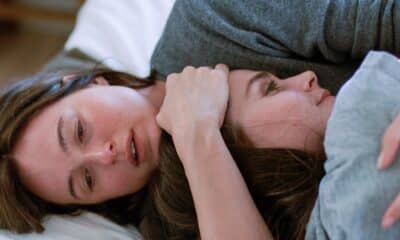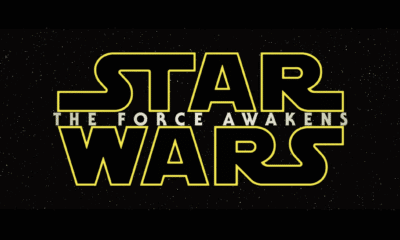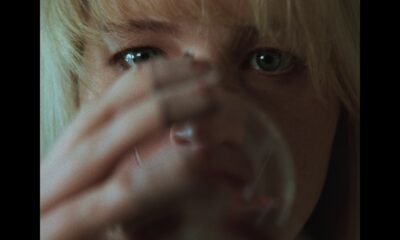
Fans of Wes Anderson won’t be disappointed with THE GRAND BUDAPEST HOTEL as it holds all his hallmarks – and a little bit more, check out our review. Among the tremendous ensemble cast is Edward Norton, one of our more elusive actors of recent times but also gave a great turn in MOONRISE KINGDOM.
Norton, a fan of Anderson’s work since he saw the director’s feature film debut, BOTTLE ROCKET, plays Henckels, the captain of the Lutz military police in Anderson’s vividly imagined, fictitious European country of Zubrowka.
Q: Did you guys decide to work together again on Moonrise Kingdom?
A: Yeah. Wes and I had sort of exchanged mutual appreciation a long time ago. He saw me in a play and sent me a really nice letter, and I had written him about some of his films. I think I wrote him a letter about Rushmore, when it came out. We both live in New York. I think we both had this notion that maybe it would be great to do something, but I never pressed on it, just because it has to come from Wes. He has such a specific set of visions and I think you have to fit within it. Now that we’ve worked together we really enjoyed it. Also, I think Wes likes to work with people and if he feels that you’re at home within the repertory company feeling of what he does, that gives him a good conviction. I think he needs people who have faith in that, and in him, and then, in some sense, you can be part of the company.
Q: What did you make of it when you first read it?
A: I thought it was great. I thought that Gustave was one of the best characters he has ever written. When you’re reading the script, I had the feeling that Gustave was an almost instantaneously classical, classic character. I was laughing so hard reading him. His worldview is so funny and so memorable, and all of his righteous indignation. That was my first reaction – that Gustave was one of the best characters that Wes had ever created. And he told me he had had Ralph [Fiennes] in mind, not that he was asking my opinion. I said, ‘I literally cannot think of anybody better.’ I said, ‘If you’d told me anybody else, I’d bang down your door to say I want to play that part.’ But it was so well suited to everything that’s great about Ralph. I just thought it was so funny and touching, as Wes’s stuff often is: there’s a lot of humour, but then there’s poignancy under it.
Q: Did you instantly sign up on reading the script?
A: Yes, within certain modest limits of availability. If he wanted to one this coming winter, I’m directing a film, so that would be a little tough, but the nice thing about Wes is he tends to plan pretty far out, so you get a pretty decent heads up that it’s coming, so it makes it a little easier to block out the time.
Q: Did you all stay together while shooting the film? I know that happened on Moonrise Kingdom.
A: We filmed mostly in this very small town in Germany called Gorlitz. Wes and Jeremy (Dawson, producer) had done their thing. They had picked a very modest little hotel, and essentially did a deal with them to make it the Budapest cast and crew central. So everybody was in it, and there was nobody else. It was the middle of winter. He created almost a boarding house, with communal dinners. It’s actually very cost-efficient too. Jeremy is a genius at making things work for Wes within certain budgets.
Q: Does everyone talk about work the whole time?
A: No, I think it’s the opposite. It’s fun. Ralph and I were talking about it: it’s more like life in the theatre. It’s more the rhythm of the theatrical repertory company where you’re doing plays throughout a season but everybody lives in whatever small town you’re in. Everybody sort of switches off and it’s very congenial.
Q: Does Wes allow any improvisation?
A: Having worked with Wes once before, you do have to surrender to the prison of Wes’s precision. You have to surrender to the constrictions. You have to surrender to the idea that your improvisational capacity to put a twist on something is going to be narrowly restricted to the very strict confines of the rhythm that Wes has written it in. I watched Ralph going against is, at times, feeling hemmed in, but – I think he said it today – you come to realise, ‘Well, I have to creatively think about how much diversity of interpretation I can bring, inside the narrow corridor of the way Wes sees it.’ Not to get too technical, but it sort of reminds me of Meisner exercises. Sanford Meisner used to say, ‘Work only with these words, but give me six different intentions, within those words.’ And that’s sort of what working with Wes is like. ‘No, I don’t want you to change a word, I don’t want you to change a comma, I don’t want you to extemporise it, I don’t even want you to put an accent on it. But within that give me everything you’ve got.’ It becomes an interesting exercise.
Q: What’s it like for the younger cast coming into that atmosphere?
A: I think Tony (Revolori) was very adept. The kids on Moonrise Kingdom were great, but I think that there’s more of Wes’s hand – I don’t want to say puppeteering, because that’s not the right word – but Wes moulded the clay of those kids. Maybe it’s because Tony’s a little older, but he was also very facile and I mean that in the best way. I would say Wes had a very easy time conducting. Tony was very adept at grasping Wes’s rhythms of comedy and delivery. I thought he was impressive. He made life really easy for Wes on this one. Because I think, maybe like Jason (Schwartzman) in Rushmore, he had a very intuitive feeling for the aspirational quality of that young person in this adult world. I think a lot of Wes’s young people are aspiring to me much older, in a certain sense.
Q: How does Wes assemble these incredible casts? Prolific actors seem happy to take smaller roles.
A: It’s like Bill [Murray] said today, ‘you lose money on the job,’ literally (laughs). But I think that Wes creates a feeling of community that hits a romantic nerve in a lot of actors. There’s a romance to something like Saturday Night Live or a repertory theatre – a gang that hangs together and does things over and over, and one has a bigger part this time and a smaller part next time. It’s a throw back, like if you think of Orson Welles and The Mercury Theatre, or group theatre. Those are very storied communities in the culture of our world. I think that idea of inclusion in a regular group has a romance to it for actors. Woody Allen is a little different, I think. He used to have that more. I think to some degree now, it’s almost like people just want to be a part of the body of work. I don’t think it’s so much that he creates that troupe feeling. Wes has carved this little redoubt against the cynical big budget movie making experience, which feels very fractured.
Q: Does he show you things before you start filming?
A: Wes references literature, lots of other films. He usually provides a literal reference library. And then he actually does a lot of animated storyboards of sequences to give you a feeling for it. He even voices the animated storyboards. It’s the most efficient way to get to it, to hear him say it, because he has a very unique rhythm. I actually want to hear him give a line reading sometimes because it’s so funny, and then you’re going to do it and get the credit for it. And then vice-versa: I actually do think even with all of his tight and controlled way of doing things, Wes loves to get surprised by a funny rhythm or delivery. You can get him to change things a little bit around a great idea. There’s always a little bit of room.
THE GRAND BUDAPEST HOTEL is out now! Check out our review and a great feature that introduces you to the whole cast by clicking here!

Latest Posts
-
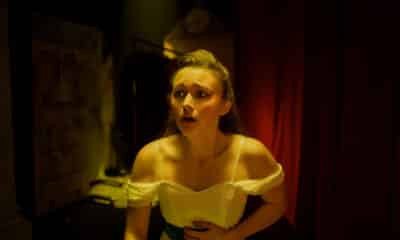

Film Reviews
/ 3 days ago‘Fear Street: Prom Queen’ review: Dir. Matt Palmer (2025)
It has been four years since Leigh Janiak’s Fear Street trilogy took horror fans...
By Kat Hughes -
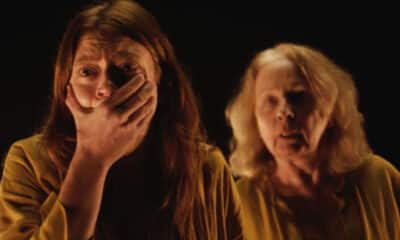

Film Reviews
/ 3 days ago‘The Surrender’ review: Dir. Julia Max (2025)
As Julia Max’s debut feature, The Surrender, unfolds, the inspirations for the film become...
By Kat Hughes -
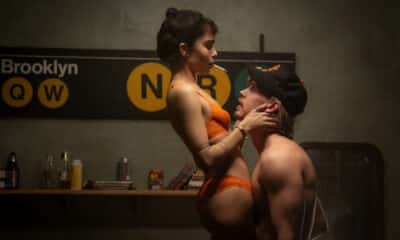

Film Trailers
/ 4 days agoFirst trailer for Darren Aronofsky’s ‘Caught Stealing’
Sony Pictures has released the debut trailer for Darren Aronofsky’s new film Caught Stealing,...
By Paul Heath -


Film Reviews
/ 5 days ago‘Lilo and Stitch’ review: Dir. Dean Fleischer Camp (2025)
Director Dean Fleischer Camp won audiences over with the fantastic Marcel the Shell with...
By Kat Hughes
